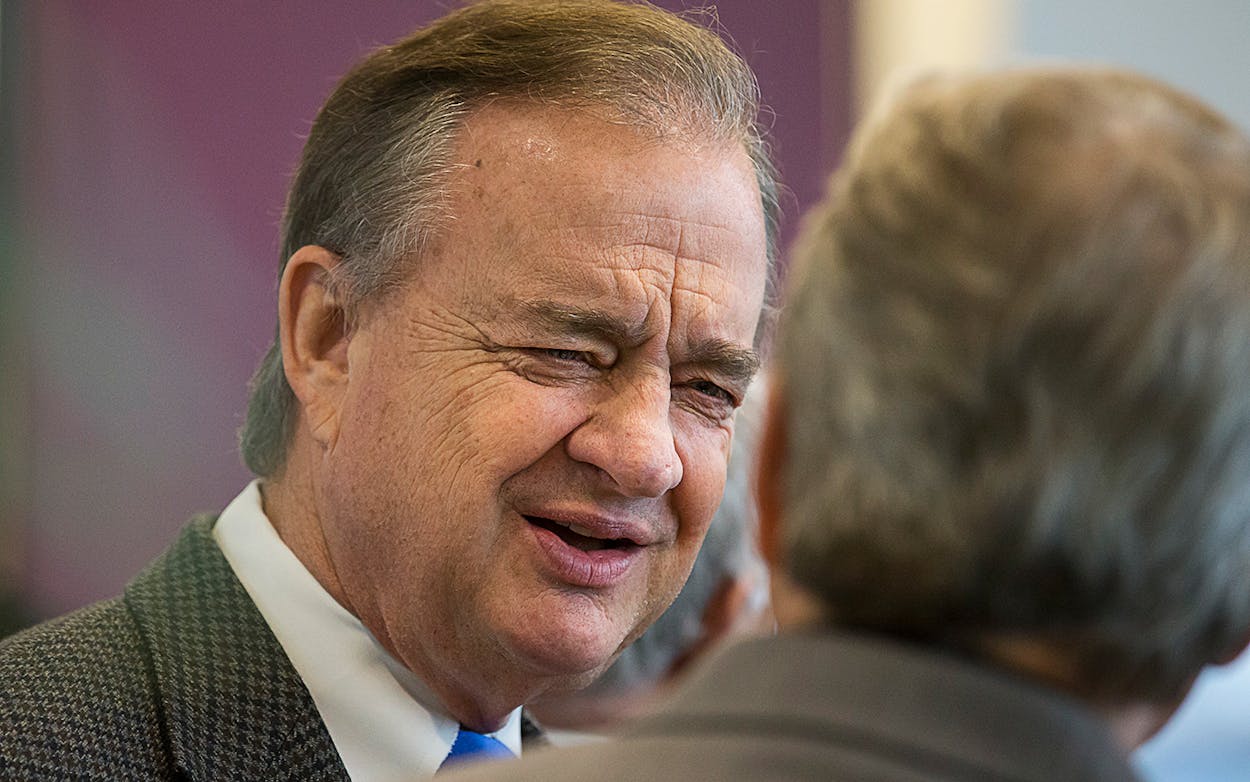Since last fall Texas A&M University has found itself embroiled in a controversy that has shined a light on the messy, conflict-riven business of scientists accepting funding from organizations with vested interests in the outcome of their research. Now Texas A&M chancellor John Sharp has entered the fray, firing back forcefully at claims made by two Harvard University professors that A&M research isn’t to be trusted because it has been partially funded by the beef industry.
This morning, Sharp sent a letter to Harvard president Lawrence Bacow in which he decried the “outrageous actions” of Harvard doctors and nutrition experts Walter Willett and Frank Hu, who also serve as directors of a nonprofit called the True Health Initiative.
Though the controversy has been roiling for months, exhaustive new reporting by the Journal of the American Medical Association seems to have prompted Sharp’s letter. According to the January 15 article, Willett, Hu, and True Health Initiative founder David Katz were part of an effort last fall that sought to have the Annals of Internal Medicine retract studies coauthored by an A&M nutrition scientist showing that evidence linking red meat to cardiovascular disease and cancer is weak, a finding that stands in stark contrast to the prevailing scientific wisdom in the subject. True Health Initiative reportedly flooded the inbox of Annals editor-in-chief Christine Laine with thousands of bot-generated emails as part of its attempt to stop the studies’ publication.
“Several of your faculty are involved as council members or advisers of THI and collaborated with THI in their effort to discredit scientific evidence that runs contrary to their ideology,” Sharp wrote to Harvard. “I can assure you that Texas A&M’s research is driven by science. Period.”
The studies were published in September, and their unconventional findings were soon picked up by media across the country. There was widespread backlash among nutrition experts who questioned the studies’ methods and pointed to the fact that lead author Bradley Johnston had received funding (though not for this specific research) from Texas A&M AgriLife Research, a university-affiliated agriculture and life sciences research agency that accepts money from the beef industry. AgriLife dean Patrick Stover was listed as a coauthor on the studies, and Johnston has since been hired by A&M as an associate professor.
In October, Hu told the New York Times that Johnston’s methods weren’t objective or rigorous. “I’m concerned about the damage that has already been done to public health recommendations,” he said.
Spurred by the new details revealed in the JAMA article, Sharp aggressively pushed back at the efforts of Hu and other critics to discredit AgriLife because of its industry ties. He took particular issue with a slide that Willett used at a recent academic conference singling AgriLife and Stover as part of a “disinformation triangle.”
“Their actions … are unethical, distort the results of important scientific research, and, in our opinion, are false and harmful to Texas A&M University and its faculty,” Sharp wrote. “These are serious matters that undermine the values espoused by your institution and must be corrected immediately.”
Although the beef industry accounts for only about 1.5 percent of AgriLife’s funding, Stover told the Washington Post this month that half of its $4.5 million in beef research in 2019 was funded by the industry, with the other half from federal government sources. Johnston did not disclose prior to the studies’ publication that he had received a grant from AgriLife. In late December, Annals issued a correction, noting that he should have disclosed the funding, but the journal continues to stand by its decision to publish the studies. The chair of the panel that reviewed the findings in advance told the New York Times that he is confident the work was not influenced by the beef industry.
It’s not uncommon for academic research to accept money from business interests, often out of necessity because of the limited availability of government grants. The Journal of the American Medical Association article notes that Katz and THI have their own industry ties—”primarily with companies and organizations that stand to profit if people eat less red meat and a more plant-based diet”—such as the Olive Wellness Institute, Plantrician Project, California Walnut Commission, Kind Healthy Snacks, and Quorn, a maker of meatless products.
A Harvard University spokesman confirmed to Texas Monthly that Sharp’s letter had been received, but he declined further comment.
This article has been amended to include Harvard’s response.








